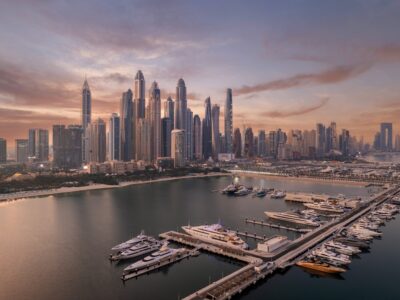ULTA beauty is launching in Dubai in partnership with Alshaya Group, the international beauty retailer is set to open its first store in Mall of the Emirates with more stores following in the pipeline. For decades, international brands have viewed the Middle East as a lucrative export market to sell Western beauty ideals to increasingly sophisticated customers.
However, America’s largest beauty retailer is aiming to flip that script entirely, opening avenues for Middle Eastern brands to grow in Western markets.
When the $10bn beauty giant opens its doors at Mall of the Emirates later this year, alongside bringing its 1,500 US stores’ worth of expertise to Dubai, ULTA will be actively scouting for Middle Eastern beauty brands to take back to the US, creating what, CEO Kecia Steelman describes as the “power of globalisation.”
Ahead of the much anticipated launch, Steelman revealed in an exclusive interview with Arabian Business that “There’s opportunities not just to bring US brands to life here, but also to bring some brands that are curated here in the Middle East, and bring them into the United States and have that power of globalisation of beauty. To me, that’s what really exciting.”
The reverse beauty brain drain represents a shift in how global beauty retailers view the Middle East as more than just customers. The approach stems from what Steelman discovered during her trips to the region. The knowledge gap, she realised, was not flowing in the direction that most Western executives might expect.
“This is my second trip to the Middle East, and I would just say the knowledge, the expertise of beauty and the education factor that we can learn from the consumer here is incredible to me,” she admitted, emphasising that companies who exhibit “humility” to learn from the customer are those that will “continue to thrive in the future.”

The Middle East beauty consumer, particularly in the UAE, represents one of the world’s most sophisticated beauty market. According to Euromonitor International, the beauty and personal care market in the broader Middle East and MENA region is valued at over $46bn and estimates that to reach $60bn by the end of this year.
ULTA Beauty’s Middle East expansion begins with three flagship locations: Kuwait’s The Avenues (opening first), followed by Mall of the Emirates and Dubai Mall. But Steelman emphasises that these aren’t test markets – they’re launchpads.
“We will be rapidly growing at pace here in the Middle East,” she said, with expansion planned across Saudi Arabia and the broader GCC region through partnership with retail giant Alshaya Group.
The partnership brings together ULTA’s 35 years of beauty retail expertise with Alshaya’s deep regional knowledge spanning over 750 brands across beauty and wellness. It enables what Steelman calls “localised, tailored assortments by the beauty and brand founders of the area, to have a concept inside the store that’s for them, by them.”
The timing is aligned as the beauty industry undergoes its most significant transformation in decades. Gen Z and Gen Alpha consumers are entering beauty at younger ages, fragrance layering is becoming an art form and the overlap between beauty and wellness continues to become stronger.
“The consumer is more educated than they’ve ever been before, so the expectation of our associates in store is much higher than it’s ever been. The trends are always fast and they’re changing, you need to make sure you’ve got an ear to the customer and what they’re looking for and how the trends are continuing to evolve,” Steelman said.
‘It’s fun to walk in our stores’
“It’s so fun to walk in our stores in the US, and I believe this is going to happen in the Middle East too, where you can have the child, the mother and the grandmother shopping and we’ve got something for everyone in the store,” she said.
Despite the digital revolution, Steelman remains bullish on physical retail, particularly in the beauty category. In the US, 80 percent of ULTA’s sales still flow through stores, with e-commerce representing 20 percent (though much of that involves online ordering with in-store pickup).
“The human connection in this category specifically is really important,” she said. “It’s that discovery, it’s the trial, it’s the hands-on, it’s the playing.”
This approach should resonate strongly in the Middle East, where beauty shopping remains a social and sensory experience.
Within five years, Steelman envisions ULTA as the “top global beauty brand.” The company’s international growth strategy is deliberately diverse including acquisition of Space NK in the UK, joint venture in Mexico and licensed franchise agreements in the Middle East. This allows ULTA to adapt to local market conditions while maintaining its core identity.
“There’s just so much heaviness in the world, and the fact that this can be a place where we all have commonality is how we all can help each other feel better about the world itself. To me, I think that is a beautiful opportunity,” she concluded.





